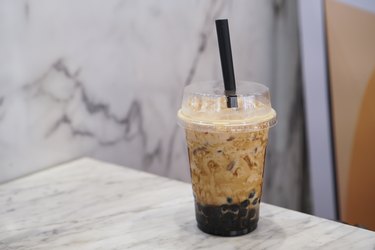
A popular Asian beverage now making its way to America, bubble tea is made by combining a mixture of tapioca pearls, milk and iced tea. Also called boba milk tea, the healthiest bubble tea will be low in added sugars and high in tapioca pearls.
Tip
A popular iced beverage, bubble tea is made from a mix of “bubbles” or tapioca pearls, iced tea and milk. Most commercially made bubble tea contains added sugars and not many mineral or vitamin benefits, so it's not the healthiest beverage option.
Video of the Day
Bubble Tea Nutrition
According to the United States Department of Agriculture (USDA), an 8-ounce or 240 milliliter serving of bubble tea has 120 calories, 1.49 grams of fat and 28.01 grams of carbohydrates. Bubble tea is generally low in protein, which is an essential macronutrient in the body required for regulating muscle building, sleep, metabolic activity and the body's energy supplies.
Video of the Day
In addition, bubble tea is also low in fiber. According to the Mayo Clinic, dietary fiber is not just crucial for relieving the symptoms of constipation, but also for lowering blood cholesterol levels and helping prevent cancer and heart disease.
The Linus Pauling Institute Micronutrient Information Center explains a healthy diet should include lots of fiber-rich foods to help digestion and satiety. The recommended total dietary fiber intake for men is 38 grams of fiber per day and 25 grams of fiber per day for women. Most Americans, however, consume less than that at just 17 grams per day.
Benefits of Bubble Tea
Some of the benefits of bubble tea include its high calcium content. Calcium, according to Harvard Health Publishing, is a mineral required by the body for healthy bones.
Americans get their dietary calcium needs primarily from consuming products where the mineral naturally occurs like in the case of dairy products. However, it is also possible to fortify food items with calcium, as in the case of the healthiest bubble tea, where an 8-ounce serving offers 250 milligrams of calcium, according to the USDA.
According to the USDA, the tapioca pearls used in bubble tea contain many essential vitamins and minerals required by the body. Some of the healthiest bubble tea with tapioca pearls will contain iron, a trace mineral needed by the body to make hemoglobin and myoglobin, two essential proteins present in the blood and muscle tissue.
It also has trace amounts of zinc, copper, selenium and manganese. These minerals are required by the body in small quantities but essential when it comes to helping with protein synthesis, regular brain function and more.
Side Effects of Bubble Tea
The most significant bubble tea health risk is its high sugar content, which varies across brands and cafes. According to the 2015-2020 Edition of the Dietary Guidelines for Americans, the recommended daily added sugar intake should be no more than 10 percent of calories consumed.
A January 2017 study published in Food Science & Nutrition explains that a 16-ounce serving of bubble tea with tapioca pearls and milk tea has 38 grams of sugar. This exceeds the daily recommended amount, which over time can result in weight gain.
Many of the added sugars in bubble tea come from high-fructose corn syrup, made from a mixture of fructose and glucose. An excess of high-fructose corn syrup in the diet is known to increase the potential risk of both liver and heart diseases. And, according to the results of a July 2014 study published in Nutrition, it can increase the risk of metabolic diseases.
Larger servings of bubble tea contain more tapioca pearls, adding to the overall calorie count. Besides, it's common to add extra ingredients like egg pudding and jelly, explain researchers of the January 2017 Food Science & Nutrition study.
This further increases their caloric count, with a large serving of bubble tea contributing as much as 25 percent of a person's total daily calories. If bubble tea is consumed regularly, over time, this may lead to weight gain, eventually resulting in the predisposition to obesity, heart disease and diabetes.
- USDA Branded Food Products Database: "Boba, Bubble Tea, Green Tea, Lychee Bobas"
- Mayo Clinic: "Dietary Fiber: Essential for a Healthy Diet”
- Linus Pauling Institute Micronutrient Information Center: “Fiber"
- Harvard Health Publishing: "What You Need to Know About Calcium”
- MyFoodData.com: "Nutrition Facts for Tapioca Pearl Dry”
- Linus Pauling Institute Micronutrient Information Center: “Selenium"
- Food Science & Nutrition: "Calories and Sugars in Boba Milk Tea: Implications for Obesity Risk in Asian Pacific Islanders”
- Nutrition: “Fructose Content in Popular Beverages Made With and Without High-Fructose Corn Syrup"
- Office of Disease Prevention and Health Promotion: "2015-2020 Edition of the Dietary Guidelines for Americans"